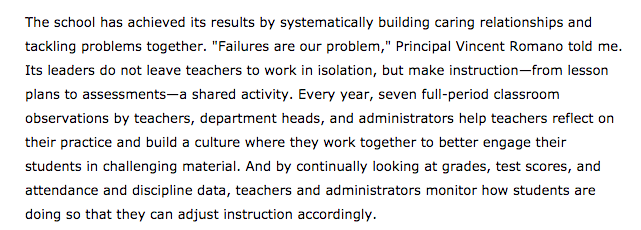nomanisan ...
On the fraud of authenticity and branding in education, and the challenging seduction of edtech.

This piece, Silicon Valley Courts Brand Name Teachers should be no real surprise to anyone who's been in education in the last decade. It focuses in on a few teachers who are creating powerful personal brands, to lead change in their classrooms, to integrate digital technology, innovative thinking and social media.
The considerations of ethics, in regards to publicly funded education in particular are well covered and worthy of further discussion.
But I was struck by this comment from Ms Delzer:
“I see the ripple effect on teachers who leave the conference,” she said. “It’s really gratifying to know that those classrooms are better because of it.”
Because does it? Are our classrooms really better after one conference?
Do the dozens of parent related blogs, Instagram accounts and Pinterest boards make us better parents?
Or do they make us feel like failures because despite all of our best efforts, our children just don't do react in the same way as that the person with half a million followers said they should. And our kitchens never look like the one we see in the social media feed that we're constantly scrolling through.
So many of our edu-tech infused visions for engaging learning, seem to have written out the rawness of learning. They have become simply 'stock-photo' experiences, that map onto a tech utopia, regardless of actual achievement outcomes or processes that may be in play. They ignore the reality of life outside the classroom, or beyond the school walls.
Or worse yet, student achievement data is simplistically correlated to the presence of Thing X, such as "faster internet", or "more devices".
Is this anodyne state what we want our places of learning to become?
Is this inability to critically view the systemic processes that may or may not have changed or made a difference because of Thing X, something we want in education?
As has been pointed out, the entire NY Times article features not one person of colour.
If that reality doesn't matter to you, then...

Heather Armstrong talks about the "fraud of authenticity" - from experience, and with a deep appreciation for the challenges this places on relationships. I think her whole talk maps well onto not just the ethical points made in the Times article, but also to challenge our concept of what we want education to look and feel like.
There's also an assumption made in the article, that these brand leaders are the most innovative, because you know, they use digital devices and online software. The comments mostly confirm this assumption.
What does having individually "innovative" teachers scattered inside our schools or unevenly distributed across the country mean?
Does it mean our schools as a whole are being lifted, being empowered, becoming better places of learning?
I'd like to hope so, because if all that's happening is that students are having a bean-bag enthused, "Starbucks" designed learning experience in one year, and then moving next door to the teacher who maybe hasn't gone to the Google course, but teaches in more traditional ways - then what impact does that have on the students?
What impact does is there on staff morale, for those who aren't seen as innovative or are not branded appropriately, when as stated:

What happens when said rockstar teacher moves on?

What happens to that school then? Does the innovation remain? Do students continue to use the tools, or will the next teacher choose new ones?
If you've been around long enough, this tweet will make perfect sense:
Isn't having Google certify you as an "Innovative Teacher" like having Second Life certify something as "Emerging Technology"?
— Matt Crosslin (@grandeped) September 2, 2017
Because it really, really isn't the tools or the brands that make the greatest difference to lifting schools and shifting teacher's thinking.
This EdWeek article from last July, For School Improvement, Demographics Aren’t Destiny nails it.

Failures are our problem.
A shared approach to tackling them, engaging with all parties, and selecting appropriate tools and responsive measures, in an ongoing loop of improvement - that's what will lift schools and the teachers within them.
The New York Times piece captures perfectly the end result of a culture built entirely on celebrating the individual and their achievements.
But for me, teachers cannot be innovative individuals who seek to create only what matters for their students alone. Not without considering how their students will be supported throughout their school years, or in their home environments.
Teachers cannot only choose tools that work for them alone. Not without considering the implications of ethics, budgets and technology - and how those factors impact on the entirety of the school community.
Teachers remain vital parts to a whole, a whole that we call schools, that sit within a construct we call community.
We need to hold to innovating and fostering up those wholes, not just the individuals.
The branding of those who remain "gratified" that their work is being shared, and who are measured as more important than other teachers is worrying, and ultimately, is still just branding for the very privately held ed-tech ventures that continue to seek to carve up public education.
But we press on.
No man is an island,
Entire of itself,
Every man is a piece of the continent,
A part of the main.
With hat tips to Meditiation XVII and the Incredibles.
